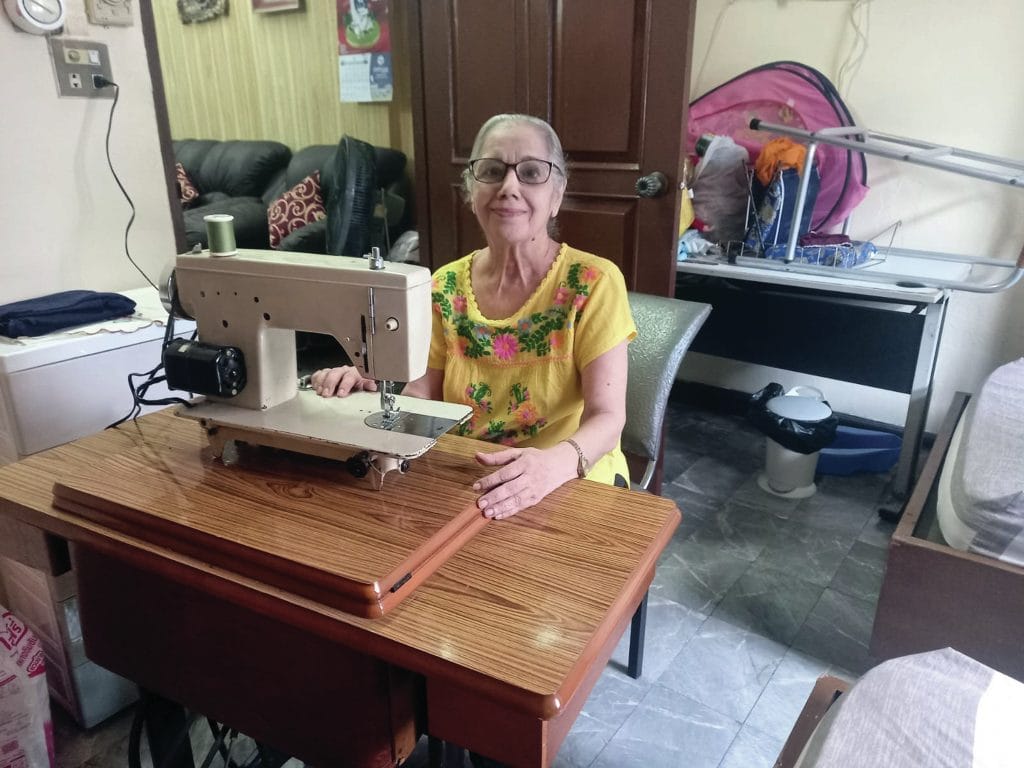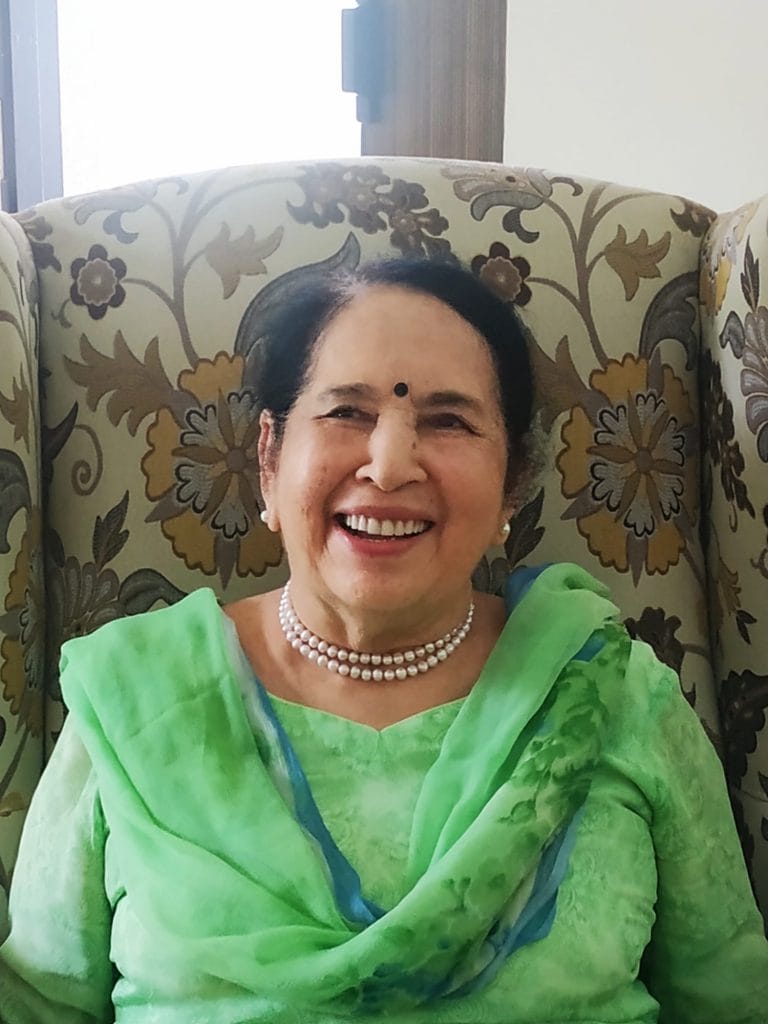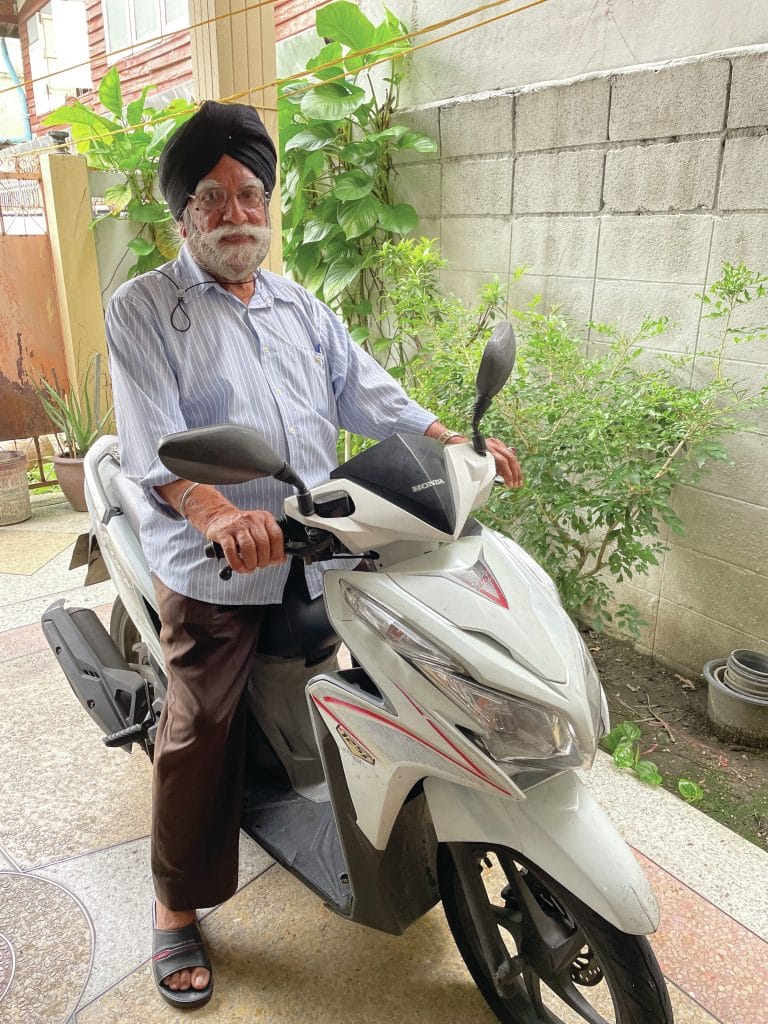A glimpse into the life of our forefathers.
By Jasnam Sachathep
Stories are so powerful. Each of us has a journey to share and there is nothing more personal than our own story. Have we ever wondered about our grandparents and how they lived? Many of them experienced a lot of hardship and struggle in building a life very different to the ones most of us live today.
Below are just a few stories shared from three different elders in the community.

SATVINDER KAUR CHAWLA
75 years old
Born in Bangkok
Three children, eight grandchildren
Can you share a bit about yourself?
I am the middle child of five. My life is a little different from many other elders, as I was born and raised in Bangkok and didn’t come from India/Pakistan. I grew up in a joint family with my father’s three brothers. When I was 16 years old, my life changed, as there was a family feud and we were left with nothing. My life took a turn, and that’s when the challenges started.
How did things change? What difficulties did you experience?
My immediate family and I moved to Vientiane, Laos, to start over. We took a train from Bangkok to the North of Thailand and a boat across to Laos. My father opened a tailor shop that also sold ready- made shirts, and we lived above that. My sister didn’t go with us as she was already married and so I was the only daughter there. My father used to always say that girls need to know and learn everything, so I helped with the family business. I was sent to a local suit lady’s house to learn how to sew; our house help rode the bicycle and I sat behind her as my father refused for me to go alone. For two and half months, I learned how to cut, sew and stitch. She taught me everything I know. My father bought me a sewing machine to use and I started helping with orders from the local Indian embassy, making mattresses and blankets. I enjoyed helping my father earn, but at least I also had time to spend with my friends.
When did you move back to Bangkok, and what happened after you got married?
Before I left for Laos, I was engaged to a boy in Bangkok. At 19, I was sent back to Bangkok to get married and my family stayed on in Laos. I didn’t want to move back or get married, but I wasn’t left with much choice. I was one of nine daughters-in-law in the family, but luckily we all got along just fine as we didn’t live together.
To keep busy, I bought myself a second-hand sewing machine. I used to go to the warehouse to help with the family business, while the nanny looked after my three kids at home. I was the caretaker of the warehouse and personally preferred to be busy working than idle at home. My skill in sewing was utilised in-house and I continued to make clothes for my children, fix whatever needed fixing, and stitch as needed (although never for monetary gain). I still have the same sewing machine today! My husband is not an easy man and my married life has not been smooth, but I was able to survive because of everything my father taught me. I kept myself busy as best as I could because that was how I remained happy.
TIRLOCHAN KAUR THAKRAL
82 years old
Moved here from Singapore
Six children, 17 grandchildren
What is your earliest memory?
I was six years old when there was a war in Pakistan and India. People were killing each other, and there was bloodshed everywhere. We ran away overnight in a truck, with my entire extended family. We were very rich back then and had a chartered plane waiting for us. My younger sister was only 20 days old. When we got to the airport, the men said the ladies should go first, so the women and children left. Everyone was crying a lot. The plane had no seats as they were all removed so we all sat on the floor.
We landed in Amritsar and stayed at a relative’s house. There were so many people in one place that we had to take a big hall and all sleep on the floor, and there was only one bathroom between all of us. We needed to take a ship to come to Singapore, and the port was in Madras. Unfortunately, in Madras, I got typhoid and stayed in the hospital for three months. The rest of the family left and only my immediate family stayed back – my parents and four of us children at the time (three more came later). I had lost consciousness and all ability to walk, and the doctors had given up all hope on my recovery. My hair even fell out. Miraculously, I recovered, but I had to relearn how to walk.
Where did your family finally settle? What was life like?
When we finally left Madras, we took a ship to Kuala Lumpur and stayed with my uncle. One day, he took the elders to the reservoir for an outing and tragically drowned in the water. It was such a terrible and sudden event that shook the whole family. The uncle was the reason we went to Kuala Lumpur, so everything changed and we took the train to resettle in Singapore.
We stayed with everyone: four rooms, four families, each with 6-7 children. There was only one bathroom between us all, and life wasn’t easy. We didn’t have the wealth that we had in India, we had no help, and everyone was pitching in. My father’s younger brother included my father into his existing business, and that’s how we slowly built our life.
Singapore was under British rule at the time, so we were put into a convent school. We ate English food in school and wore uniforms with pleats and folds with white socks. I got a British passport and adopted their mannerisms and ways. Between attending school, I was also responsible for looking after my siblings, watering the plants, ironing everyone’s uniforms etc.
Can you share a bit about your married life? Where did you live?
I got married at the age of 16 and moved to Bangkok to a very different kind of family from what I was used to. I had a big family to look after, as my husband has many brothers. Having been exposed to and surrounded by British culture, I was very used to eating different kinds of food and behaving in very proper ways. It took me time to adjust and everyone called me a ‘little lady.’
I had my first baby at 18, followed by five more all in the span of nine years. I lived in Bangkok for 22 years. In 1974, when I was 34 years old, my husband, six children, my husband’s widowed sister, and myself moved to America. We hoped to start a business there and stayed for three years before coming back to Singapore. I would say that this was the best time of my life. It was the most hardworking time, but also the only time I could lead my life the way I wanted to, and spend quality time with my children. During this time, we had a lot of family visit so we always remained close and connected.
KULDIP SINGH SACHDEV
86 years old
Born in Bangkok
Three children, seven grandchildren
How did you end up in Thailand?
When I was 12 years old, I left my hometown Chuchar-Kana Mandi (now in Pakistan) with my entire extended family of 22 people due to the partition. From my immediate family was my mother, my brother and me. My father was tragically murdered before escaping. We stayed in a refugee camp and sat in an army truck to the Indian border. We took the train to Delhi and lived on the railway station platform for three weeks; built a little home there, cooked food there – all of us 22 people together. It was winter at the time, so we got hot water from the steam of the train to mix with cold water just for a warm bath.
After that, we took the train to Calcutta. There we lived in a Gurudwara, a Sikh temple, and waited for the ship to take us to Penang. We had an older uncle in Thailand so the aim was to make it there. When the ship finally arrived, we stayed on it for eight days; it was a Chinese cargo ship and it was packed with people.
As Penang was under British rule, we had to quarantine because we came from India and were thought to carry diseases. There was a big swimming pool that they had put some liquid in and we were all put in there to wash ourselves twice a day; morning and night. Our baggage was also steamed to kill the germs. We stayed in the Gurudwara for 2-3 weeks before heading to Thailand by train; arrived in Hat Yai and then headed to Yala – our elder uncle and the family business was there. It was the first time we stayed in an actual home since we left our own.
How did you settle in and what was life like?
I stayed there for nine months and didn’t do much at all. I attended a Thai school for one week in that entire time because I was put with small children as I didn’t know the local language. We arrived in Bangkok and I left for India to study. I was in ninth grade for nine months and I learnt a lot, including the English language. The family business was in a crisis because of the Korean War and all the capital we had was gone. That is how I started working at the age of 15. I have four uncles and for the first time, the family split up. I went to work with my elder uncle in Ubon, and I used to sell fabric. When required, I used to drive 100km on the bicycle to sell fabric to earn money. I did this for five years and I finally got married at the age of 26, but I was determined to earn and make money.
What did you learn through all the hardship?
Because I experienced financial hardship, I have always been frugal in my spending. Till today, I drive my motorbike to the shop in Sampheng and enjoy being independent. I do the house groceries and go to Makro to remain active. I refuse to become weak and idle. Life has not been easy, but I am thankful for all that I have. I always tell my grandchildren that every baht counts!
This is just a glimpse into the life that some of our elders had. Their stories of struggle and survival should give us strength to deal with situations that we face today. Let’s make time and ask our grandparents for their stories too!








